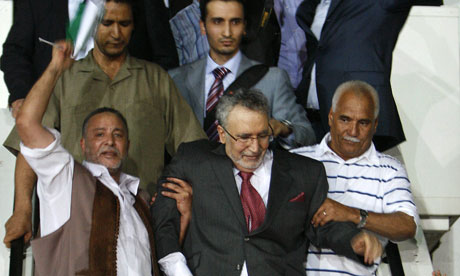http://www.sfgate.com/cgi-bin/article.cgi?file=/c/a/2011/08/06/MNA71KK6OJ.DTLBy voting Republicans in the last congress elections, had to the
current dilemma of US credit rating downgrading. Instead of taxing the
rich as Clinton had done successfully, they still want to continue the
failed Bush economics.
Americans think that by not taxing the rich, the rich will create
jobs. They failed to see the facts. It didn't. Obama failed because
these tax reductions for the rich is still effective during Obama's
term.
What the rich want is to stop health and education help which can kill
many poor US citizens. The stupid Americans even believe that these
taxes will be applied to the the poor which is a blatant lie, and
stupidly refuse to see the facts.
When reductions of health benefits for the rich, such as health
benefits for Congressmen, these people refuse to budge also.
U.S. credit rating downgraded by Standard & Poor's
Zachary A. Goldfarb, Washington Post
washington post August 6, 2011 04:00 AM Copyright washington post. All
rights reserved. This material may not be published, broadcast,
rewritten or redistributed.
Saturday, August 6, 2011
Print E-mail
deliciousdel.icio.us
diggDigg
technoratiTechnorati
redditReddit
facebookLinkedIn
facebookFacebook slashdotSlashdot
farkFark
newsvineNewsvine
googleGoogle Bookmarks
twitterTwitter
Share Comments (1)
Georgia (default)
Verdana
Times New Roman
Arial
Font | Size:
55
Andrew Burton / Getty Images
An ABC News ticker announces the U.S. credit rating cut in New York
City's Times Square.
View Larger Image
More News
* San Quentin prisoners steal show with Shakespeare 08.06.11
* Jurors to be told not to tweet under new law 08.06.11
* Obama raises 60% of all California donations 08.06.11
* Rebels launch push in western Libya, aim for coast 08.06.11
Standard & Poor's announced Friday night that it downgraded the credit
rating of the United States for the first time, dealing a symbolic
blow to the world's economic superpower in what was a sharply worded
critique of the American political system.
Lowering the nation's rating to one notch below triple-A, the credit
rating company said "political brinksmanship" in the debate over the
debt had made the U.S. government's ability to manage its finances
"less stable, less effective and less predictable." It said the
bipartisan agreement reached this week to find at least $2.1 trillion
in budget savings fell short of what was necessary to tame the
nation's debt over time and predicted that leaders would not be likely
to achieve more savings in the future.
"It's always possible the rating will come back, but we don't think
it's coming back any time soon," said David Beers, head of S&P's
sovereign debt rating unit.
The decision came after an afternoon of furious debate between the
Obama administration and S&P. Government officials argued S&P's
analysis of the potential for political agreement was flawed and that
its initial report contained mathematical errors - the company had
overstated the U.S. deficit over 10 years by $2 trillion.
"A judgment flawed by a $2 trillion error speaks for itself," a
Treasury spokesman said Friday.
Uncharted territory
The downgrade to double-A-plus will push the global financial markets
into uncharted territory after a volatile week fueled by concerns over
a worsening debt crisis in Europe and a faltering economy in the
United States.
The triple-A rating has made the U.S. Treasury bond one of the world's
safest investments - and has helped the nation borrow at
extraordinarily cheap rates to finance its government operations,
including two wars and an expensive social safety net for retirees.
Treasury bonds also have been an island of stability amid the economic
upheaval of the past few years. The nation has had a triple-A rating
for 70 years.
Analysts say that, over time, the downgrade could push up borrowing
costs for the U.S. government, costing taxpayers tens of billions of
dollars a year. It could also drive up interest rates for consumers
and companies seeking mortgages, credit cards and business loans.
A downgrade may also have a cascading effect on states and localities.
These governments could lose their triple-A credit ratings as well,
potentially raising the cost of borrowing for schools, roads and
parks.
But the exact impact of the downgrade won't be known until at least
Sunday night, when Asian markets open, and perhaps not fully grasped
for months. Analysts say the initial effect on the markets may be
modest because they have been anticipating an S&P downgrade for weeks.
And even without a triple-A rating from S&P, U.S. debt is seen as one
of the safest investments in the world. Investors clearly weren't
scared away this week. While stocks were plunging, investors were
buying Treasurys and driving up their prices.
The ratings action immediately fueled partisan wrangling Friday night.
Allies of President Obama said it underscored his call for a "grand
bargain" that would trim $4 trillion from the federal budget involving
a mix of tax revenue and spending cuts.
Republicans criticized Obama's handling of the economy. "Standard &
Poor's rating downgrade is a deeply troubling indicator of our
country's decline under President Obama," Republican presidential
candidate Mitt Romney said.
S&P has angered government officials with aggressive warnings over the
past few months of a potential downgrade. Those warnings, so far, have
not worried government bond markets.
What's more, the two other major credit rating companies, Moody's
Investors Service and Fitch Ratings, have said they would preserve the
nation's triple-A rating for now.
S&P's downgrade was as much a political critique as a financial
conclusion. It is based on a view that American political leaders
would be unable to come up with at least $4 trillion in savings, which
is needed to bring the nation's debt to a manageable level over the
next decade.
The debt deal passed by Congress earlier this week proposed spending
cuts in two phases. Democrats and Republicans agreed to the first
round, worth nearly $1 trillion. But a congressional committee must
decide the remaining $1.2 trillion to $1.5 trillion, and S&P
questioned whether that would ever happen.
Indictment of gridlock
S&P added that it expects that the upper-income Bush-era tax cuts will
continue, despite vows from Obama to end the breaks next year.
"The majority of Republicans in Congress continue to resist any
measure that would raise revenues," the firm said.
S&P's downgrade served as an indictment of the gridlock that sent the
nation to the edge of defaulting on its debt obligations. It is also
striking in part because it reflects the tremendous power of a small
group of financial analysts employed by a New York company, part of
McGraw-Hill. In Europe, political leaders have taken aim at credit
rating companies when they cut the ratings of governments struggling
with heavy debt burdens.
The company said the United States' financial position was diverging
from that of other triple-A countries, including Canada, France,
Germany and Britain.
Countries with a double-A-plus rating include New Zealand and Belgium.
Among those countries with a double-A rating, one notch lower, are
Bermuda, Spain and Qatar.
The Associated Press contributed to this report.
Read more: http://www.sfgate.com/cgi-bin/article.cgi?f=/c/a/2011/08/05/MNA71KK6OJ.DTL#ixzz1UF6YGac3
 larger | smaller
larger | smaller 
 draddee: RT @AJELive: #Syrian forces shot dead 26 #blindfolded men, top #UN officials say http://t.co/qFwWbQk
draddee: RT @AJELive: #Syrian forces shot dead 26 #blindfolded men, top #UN officials say http://t.co/qFwWbQk Moawen: AP: #Bahrain protesters clash with security forces http://t.co/u8uafEp
Moawen: AP: #Bahrain protesters clash with security forces http://t.co/u8uafEp sharifkouddous: RT @adamakary: CONFIRMED: The gunfire that killed two Egyptian conscripts this evening near the Egyptian-Israeli border came from #Israel
sharifkouddous: RT @adamakary: CONFIRMED: The gunfire that killed two Egyptian conscripts this evening near the Egyptian-Israeli border came from #Israel Brian Whitaker's best blogs and analysis from the Middle East
Brian Whitaker's best blogs and analysis from the Middle EastFrom The Daily Star >> Opinion >> Commentary
From Jadaliyya Ezine
From Rebel With A Cause
From The Moor Next Door
 1. Riot sentence rift opens between Liberal Democrats and Conservatives
1. Riot sentence rift opens between Liberal Democrats and Conservatives  1. Thousands attend funeral for three killed in Birmingham riots – in pictures
1. Thousands attend funeral for three killed in Birmingham riots – in pictures 1. Westwood by Stella Gibbons £7.99




